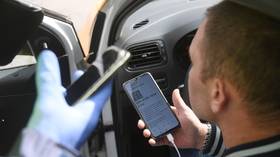21 Russian regions to adopt QR-code system to RESTRICT MOVEMENT during quarantine

As Moscow goes, so goes the nation – at least when it comes to coronavirus. When the capital shut down, the country quickly followed. Now, some Russian regions are copying another Moscow initiative – digital passes to go outside.
Some 21 of Russia's 85 regions will join Moscow in implementing a QR-code digital pass system for the duration of the self-isolation regime.
In a statement posted online, the Russian Ministry of Communications announced that, following an online video conference, "21 federal [states] of the Russian Federation [applied] to introduce a national solution for issuing digital passes."
Also on rt.com Russian city inside Arctic Circle to use ELECTRONIC TAGS to track coronavirus patientsEarlier this month, the Russian capital began issuing QR-codes to those who applied online. After inputting personal information, vehicle registration, and reason for travel, Muscovites are emailed a code, which must be shown to police upon demand. The new nationwide system will work similarly, with Russians around the country applying for a pass on the official 'Stopkoronavirus' mobile app.
Although everything in Moscow is now running smoothly, the QR-code system got off to a rough start last week, as huge queues formed at metro entrances throughout the city. The system has since been streamlined.
Помните как неделю назад "полезные блогеры" причитали про разгул любителей шашлыка?А теперь работа властей: Вот сегодня утром метро Преображенская площадь в Москве проверка пропусков.Ну что победили шашлычников? pic.twitter.com/MnRdjdzrFb
— Sergey Elkin (@Sergey_Elkin) April 15, 2020
The new system rollout will begin with just seven regions in central Russia, and, one week later, 14 more areas from across the country will join in.
On Wednesday, Moscow Mayor Sergey Sobyanin proposed extending the usage of digital passes to all parts of Russia. "I believe that [the system] can be extended not only to nearby regions, but also to other regions, with the aim of controlling movement by air, rail, intercity, and interregional bus services," he said.
Like this story? Share it with a friend!














